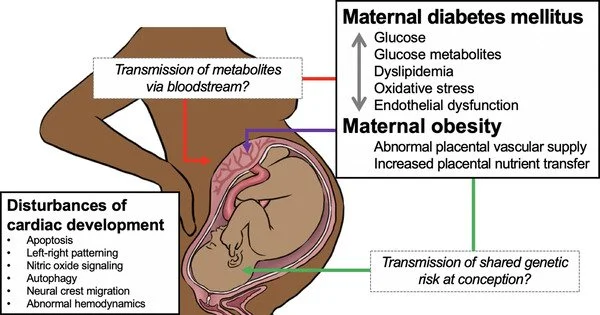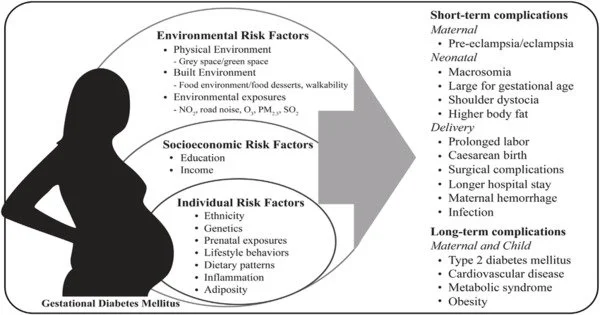Maternal obesity and pregnancy difficulties are both substantial risk factors for developing heart disease later in life. While both are related to an elevated risk of heart disease, it is impossible to conclude conclusively that one predicts heart disease risk better than the other because they frequently coexist and interact.
Preeclampsia and prenatal diabetes, for example, have lately been linked to an increased risk of having heart disease later in life. A new Northwestern Medicine study, however, has discovered that obesity before or during pregnancy is the true root cause of future cardiovascular illness.
Prior to this study, scientists were unsure whether obesity or pregnancy problems played a greater influence on the risk of cardiovascular disease years after pregnancy. This big, multi-center, and diverse study is the first to address that question, concluding that pre-pregnancy obesity is the real cause of both poor pregnancy outcomes and future cardiovascular disease risk. It is one of the few studies that follows its subjects – around half of whom were overweight or obese – from the start of their first pregnancy to many years postpartum.
“We demonstrate, for the first time, that adverse pregnancy outcomes are primary indicators – and not the root cause – of future heart health,” said corresponding author Dr. Sadiya Khan, the Magerstadt Professor of Cardiovascular Epidemiology at Northwestern University Feinberg School of Medicine and a Northwestern Medicine physician. “This means that pregnancy just reveals the risk for heart disease that is already there.”
The findings will be published in the journal Circulation Research.
Our hypothesis was that it may be that the pregnancy complications are unmasking these things since, as we know, pregnancy is a natural stress test for the heart. These findings are important because if pre-pregnancy obesity is the culprit or cause of risk, we should be targeting this with interventions.
Dr. Sadiya Khan
‘Pregnancy is a natural stress test for the heart’
The researchers analyzed data from the nuMoM2b Heart Health Study to track 4,216 first-time mothers from the early stages of their pregnancy to an average of 3.7 years postpartum. At the first study visit in early pregnancy, the average maternal age was 27 years old, 53% had a normal body mass index (BMI), 25% were overweight, and 22% were obese. Individuals with an overweight or obese BMI in early pregnancy had a higher chance of having hypertensive disorders of pregnancy than those with a normal BMI.
The researchers hoped to learn more about the links between maternal obesity, hypertensive disorders of pregnancy, and other negative pregnancy outcomes, and cardiovascular health several years after birth.
“Our hypothesis was that it may be that the pregnancy complications are unmasking these things since, as we know, pregnancy is a natural stress test for the heart,” Khan said. “These findings are important because if pre-pregnancy obesity is the culprit or cause of risk, we should be targeting this with interventions. We don’t want to just wait until people have these cardiovascular events; we want to stop them from happening,” Khan said.

Obesity intervention before pregnancy is key
The concept of the “Zero trimester,” or pre-pregnancy wellness, is a prominent theme in Khan’s research. By boosting health during this vital time in a person’s life, they can enhance results not only for their pregnancy and infant but also for their personal long-term health, according to Khan.
According to Khan, it can be difficult to target people before they become pregnant. So, when people are more likely to contact physicians during prenatal visits, early in the pregnancy may be an appropriate moment to counsel on heart-healthy habits like diet and exercise.
“We definitely do not want to recommend weight loss during pregnancy but do want to recommend counseling and monitoring for appropriate gestational weight gain,” Khan said. “It is one of the few times in life that you are seeing the doctor frequently while you’re healthy.”
Pregnant individuals can safely limit their weight gain throughout pregnancy by eating healthy and exercising moderately or even vigorously, studies have shown.
More about the study
Pregnant individuals in the study were seen at eight clinical centers across the U.S., including Northwestern University. Individuals were 18 years or older and did not have any history of pre-pregnancy hypertension or diabetes.
Approximately 15% of all individuals had a high blood pressure issue; 11% had a baby with a low birth weight; 8% had a preterm birth; and 4% had gestational diabetes. Those with difficulties associated to high blood pressure were 97% more likely to have high blood pressure and 31% more likely to have high cholesterol in the years after pregnancy.
Body weight did not appear to be a risk factor for some problems, according to the study. People who were overweight or obese, for example, did not have an increased chance of having a preterm birth or a baby with a low birth weight. Those who had preterm deliveries, on the other hand, had a greater chance of having high blood pressure, high blood sugar, or high cholesterol following pregnancy. Having a baby born with a low birth weight wasn’t found to increase risks.
















